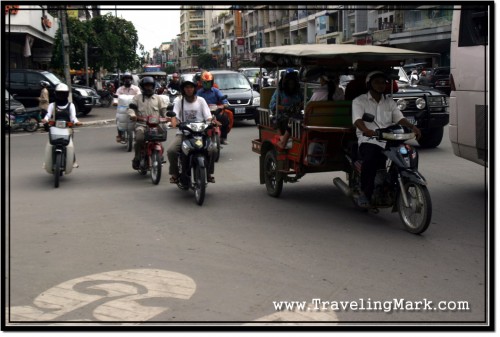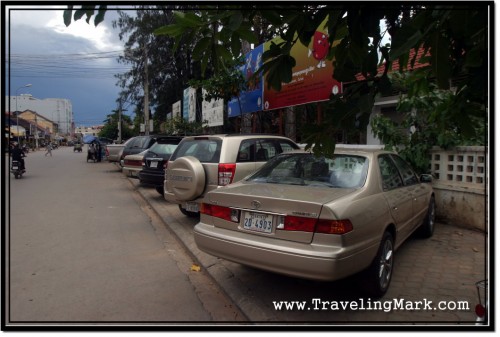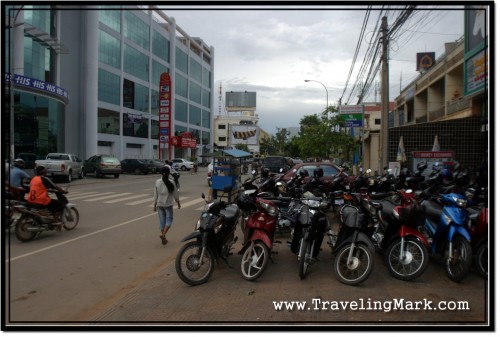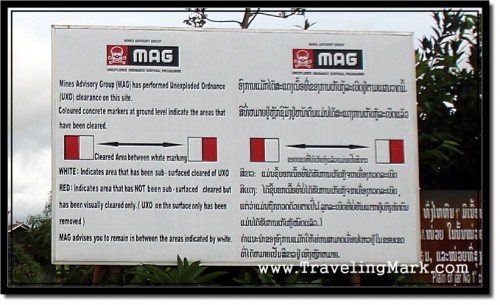Considering how crime ridden Cambodia really is, it’s hard to imagine that tourists and expats could be exposed to a danger that’s far more serious than violent crime. Yet it’s true. Traffic safety issues are so severe in Cambodia, they put country’s violent crime to shame. And that’s something that’s not to be taken lightly. Afterall, Cambodia is one of the most violent countries in the world, a country in which mob killings and political violence gain epic proportions. Just imagine how dangerous Cambodia’s traffic must be if it’s even deadlier than their ongoing genocide.
Cambodian corrupt government is too busy exploiting country’s natural and historical resources to give a dump about alarming crime rates or traffic safety issues which translates to a dangerous society whether you only fly by or stay for a while.

Unqualified Drivers
One of the reasons contributing to an extremely dangerous traffic situation in Cambodia are unqualified and uneducated drivers. Thousands of motorcycles are operated by children as young as 10 years old. Proper driver’s education doesn’t exist in Cambodia and since traffic laws are both non existent and not enforced, nobody even tries to get educated and become a safe driver.
Cambodian Traffic Laws
There allegedly are some traffic laws in Cambodia but the enforcement is not a priority of the government which is too focused on securing their position by removing everyone in their path. The police occasionally go out to give fines – when they need an extra cash in their own pockets – but that doesn’t mean anyone in Cambodia gives a crap about the rules. They like to fine foreigners because foreigners don’t know regular traffic fines are about 3,000 Riel (roughly $0.75) and ask for $20 or so. If it ever happens to you, make sure you request a “sombot” which is a Khmer word for “receipt”. Traffic infractions in Cambodia have fixed fines so asking for a receipt may prevent the police from extorting outrageous amounts of money from you.
Speaking of traffic laws – at the time of this post, there has been no traffic law in Cambodia outlawing drunk driving. Not surprisingly, DUI is one of the main reasons for grisly ends to many traffic accidents.
What Side Do Cambodians Drive On?
Officially, Cambodians should drive on the right – same as in the USA, Canada or mainland Europe, but as with other traffic regulations, this requirement is not enforced and is as such completely ignored. You will have all sorts of vehicles coming at you from all sides, joining the traffic by riding in opposite direction, reversing into the traffic, ignoring red lights or stop signs, never ever yielding to anyone whose vehicle is smaller than theirs. The video below contains a footage of a motorcyclist riding in the opposite direction and a Cambodian cop being a complete waste of space:
Traffic Anarchy
Cambodian traffic situation can best be described as a complete traffic anarchy. Nobody follows any rules, everybody does what the hell they want even though nobody actually knows what the hell they are doing. And as could be expected from an anarchy – the bigger a vehicle you drive, the more arrogant you get while on the road. As it is with carrying and flashing guns, driving and purposefully oppressing all other traffic participants, including the pedestrians is nothing more than an attempt to compensate for inadequacies and insecurities.
As soon as Cambodians get off their vehicles, they become pedestrians and will have to dodge all the vehicles which will never make any attempt to slow down or stir away for someone smaller in size. Hence when they get back in their vehicle, the feeling of being oppressed goes away and now it’s them who become the oppressors. The full circle gets closed.
Pedestrians
There are a few pedestrian crossings (zebras) here and there on the roads with busy traffic to presumably allow the pedestrians to cross the street. I don’t know who came with an idea of painting the zebras on the road as it’s been nothing but a complete and utter waste of paint. As a pedestrian, you can wait as long as you want for someone to stop and let you cross – afterall you are on a cross walk – but no one ever will. Ever. No Cambodian will ever stop for a pedestrian. Not even in your wildest dream. They need to compensate for their insecurities and yielding to a pedestrian when you are on a motorcycle or inside a car simply diminishes their egos.
I first noticed the inability to cross the street on my first ever walk through Siem Reap right after I had landed in Cambodia. I stood at the pedestrian crossing for a good while, I stepped down on the road to make it absolutely clear that I am intending to cross the road on that cross walk, I even made a step forward in an attempt to move across thinking that once I start moving along the zebra, the drivers would stop but even though everyone could see me, nobody stopped. As a matter of fact, nobody even as little as slowed down. Not a slightest attempt to allow me to get through. Complete arrogance and ignorance which was also doubled by local’s mean-spirited nature who had a good laugh watching me stuck, unable to cross because nobody would respect the crosswalk.
Shockingly, as if no respect towards pedestrians by the drivers was not enough, Cambodians also like to park their cars and motorcycles on the sidewalks making it impossible to use them for walking. As a pedestrian, you will spend more time walking on the roads, than on the sidewalks because sidewalks are simply blocked off by rudely parked vehicles of all sorts. But then by having to walk on the road you will be subjected to rude, disrespectful drivers and moto riders swerving through the traffic from all directions, putting you directly in harm’s way.

The danger doesn’t stop there, though. Remember those cars and motorcycles parked all over the sidewalks preventing you from walking somewhat separated from extremely dangerous roads? Well, with so many vehicles blocking up the sidewalk, every time you go for a walk, you will have dozens of them backing off into the traffic on the road, literally reversing right into you, who has to walk along the side of the road because sidewalks are blocked off. Nobody will wink an eye if a pedestrian or a bicyclist is behind them, they will continue reversing, until they either ran you over, or you jumped off to save your life.

The video below shows how sidewalks in Phnom Penh are full of rudely parked cars and motorcycles giving pedestrians absolutely no chance to walk separated from dangerous traffic on the roads:
Riding a Bicycle in Cambodia
Oh boy. I bought a mountain bike when I got to Cambodia to have my own, independent means of transportation and while it means slightly more respect than walking, it surely doesn’t raise it by much. You get buses plowing it down the middle of the narrow road at full speed with zero respect for bicycles. Unwilling to stick to their side of the road, as a bicyclist you are left with mere inches of room and a choice to make – do I kill myself by throwing myself into a ditch at full speed or by staying on the road to let the gust of air created by the speeding bus throw me there?
Wearing Helmets
Unlike it is in Vietnam, when you take a moto ride in Cambodia, the driver will not provide you with a helmet. That slaps the whole road safety right in the face and makes you extremely prone to serious injury. While it is allegedly required by the law for the drivers to wear a helmet, not everybody does and if they do, they are the only ones on the motorcycle wearing one.
You will see entire families, sometimes with as many as 7 members packed up on a scooter whistling away down the muddy roads. For the most part, there is either nobody with a helmet on it, or only the driver has one, the other passengers are without. It’s a massacre in the making.
Honking Horns
Cambodians love honking horns. It has everything to do with compensating for their insecurities. Once they sit behind the wheel of a vehicle, they feel empowered and spend their entire time honking horns to let everyone know they are coming. Whether there is a reason to honk a horn or not, they do. The blaring of horns is a constant on Cambodian roads. Check out the horn crazy Cambodians in a video below:
Cambodia’s traffic safety issues are a serious threat to the safety of tourists visiting the country. While Cambodia is exceptionally dangerous for tourists because of its out of control crime, vast majority of tourists stays out of crime’s way by using organized tours and not venturing off the beaten touristy tracks and places. However, even if you’re one of the many who will be spared from becoming victims of Cambodian violent culture, you will not be able to avoid the dangers of Cambodia’s traffic. A combination of drunk driving, speeding and lack of safety helmets, doubled with severe disrespect for other traffic participants with nobody following any traffic rules makes Cambodian roads the most dangerous place you could find yourself in.



Hello Mark,
I’ve made a mistake of coming to Cambodia and paid for it the second day of my stay. The seven day trip started at the beginning of June, 2010 and both me and my wife were excited. It was late morning when we found ourselves standing on the side of the road just across the street from La Noria waiting for the traffic to calm so we can safely get across. There was a van slowly passing down the street when out of nowhere a tuk tuk showed up and forced its way through a narrow gap between the van and the side of the road. Flying down the road at a high speed, tuk tuk swirled around the van, hitting me in the head with the cage that’s attached to the bike (the part where people sit). Being punched right in the face with metal rods sent me down to the ground. My glasses were shuttered about 15 meters away. The tuk tuk never bothered to stop, only looked over his shoulder, shrugged it off and continued as if hitting pedestrians was a daily thing for him. My wife told me that there were two Caucasian girls sitting in a tuk tuk when I was hit. I could not see, but my wife says they were shocked by sheer ignorance of their driver but were too speechless to react. Meantimely, the driver sped off so they were left with their hands on their open mouths, staring at us with horror.
I ended up with half of my face bruised, swollen and bleeding. Only now, three weeks later am I able to see with my left eye again. I had to get a new pair of glasses cut as my old one was destroyed in the impact. We went to report the accident to the tourist police in Siem Reap but it was the most humiliating experience ever when we were laughed at with nobody taking us seriously. The most horrifying thing was that I had to spend additional 6 days in Cambodia because we had return tickets all paid for.
From what my wife is telling me, the girls who were in the tuk tuk that hit me were in their mid twenties, Caucasian and had their backpacks with them which could mean that they had just arrived in Cambodia and were picked up at the airport (most likely as bus station is not that way). If either of you gets to read this, know that I am the guy your tuk tuk driver hit. I’ve been out of work for two weeks as a result and still look like a Frankenstein. I know this was not your fault, but the fault of the disrespectful driver who forced his way through a narrow passage disregarding the persons who were standing on the side of the road there. He bulldozered his way through me and my wife even though my wife got a chance to jump off. I didn’t. Needless to say, I will never ever go to Cambodia again and will strongly advice all the people I care about against making the same mistake.
James
I’ve been around the world on a bicycle and can confirm that Cambodia is one of the most dangerous, if not THE most dangerous country for a bicyclist. I’ve ridden through large cities (Toronto, New York, Tokyo), through Latin America which is not particularly known for obeying any traffic laws and even through Ho Chi Minh City which has streets packed with millions of motorcycle but wherever you go, there always is some form of common respect for one another and understanding of implications to the rest of the traffic when one part of it is knocked down but this doesn’t seem to exist in Cambodia. Surviving Cambodian traffic definitely counts as one of my bravest achievements and I would recommend all bicyclists to exercise extreme caution and don’t count on any common sense from other traffic participants when riding in Cambodia.
Mark, sorry you over exaggerate the transport problem in Cambodia. Unfortunately you compare it to what you are accustomed to in Canada. I have travelled extensively in Cambodia and Vietnam which is similar. These countries have high population densities which in turn produce high traffic densities. When you first encounter the chaos of their roads it appears that everyone is suicidal. In fact the opposite is true, the rule is simple, you are responsible for those immediately in front of you, you must avoid them. Likewise those behind you and to your sides will look after you. When negotiating traffic keep the forward momentum, do not stop and definitely don’t go backward. I had not seen any accidents in my stays in these countries and had only heard about one death. When you look at the cars they are not battle scarred as you imply. I took a video of a particularly busy intersection in Hanoi, Vietnam and it looked pure chaos but on careful observation when fixed just on one pedestrian or motorcycle you can see how well the system works. Now I have also travelled in equally dense parts of London and Paris and crossing a street there was certainly a lot more traumatic. Unfortunately I do agree with your observation that the police are corrupt and target the tourists for ‘special’ attention and fines.
Hi Eugene,
thank you for your input. I was in Vietnam and while it is far more densely populated than Cambodia, the rules of the road as you mention do exist. In Cambodia they don’t. The only rule is the rule of a larger vehicle (aka manhood compensation rule) and everything else is secondary. Cambodia has nowhere near the population density of Vietnam but it’s easier to participate in traffic in Vietnam than it is in Cambodia, but then again, the Vietnamese are to a point, respectful people, whereas Cambodians aren’t.
I cannot comment on Paris as I only spent one day in the city, but after more than a year in London, UK (unless you’re talking about different London), I have to strongly disagree with your comment. London is quite easily the safest city for a pedestrian to participate in traffic in. You could cross any zebra blind-folded and would not get hurt. Not only does all traffic stop immediately when a pedestrian is crossing the road, the drivers go after the brake pedal as soon as the pedestrian shows intention to approach the crosswalk (long before they enter the road).
I’ve never been to a city that would have such respectful drivers. Compared to Cambodia where no driver ever ever and ever stops for (or swerves away from) a pedestrian, London is literally a no danger zone. And that’s if we disregard the fact that you don’t have motorcyclists readily riding in the opposite lane and that green light for pedestrians usually means that no cars will be trying to run you over as you’re crossing.
Mark
Dear Mark,
I have been living in Cambodia for over 3 years and have spent almost 15 years living in London and having ridden a bicycle and driven motor vehicles in both (moto in Cambodia/car in London) I feel qualified to comment! London is a safe place to use zebra crossings, no doubt, but it is not such a safe place to ride a bicycle both due to pedestrians stepping out into the road without out bothering to check that just because they can’t hear a car that doesn’t mean there is no traffic, and because most car drivers seem unable to spot anything that is on 2 wheels, powered or otherwise. Also, London drivers, like most UK drivers are generally law abiding, but that doesn’t mean they are respectful and you only have to spend 2 minutes standing by a bus lane before you find half a dozen cars trying to use it to circumvent their way through the traffic.
Cambodian driving on the other hand is something else entirely. I never fail to be both amazed and horrified whenever I ride my moto (at least an hour every day, if not more) by the sheer insanity. There are very extensive traffic laws in Cambodia, (though not as extensive as the UK), covering areas such as not using mobile phones whilst driving, not parking on corners or junctions, having regular vehicle inspections, wearing helmets and seatbelts, obeying traffic signals, not overloading your vehicle, not driving in a manner that will cause a hazard to your fellow drivers, not having passengers on the roof of your vehicle etc all of which I am guaranteed to see flouted within 10 metres of leaving my front door. There are two issues. The first concerns a general ignorance of the traffic laws, i.e.most people don’t know there is a law against driving whilst using a mobile phone; and a general disregard for the laws that they do know about. For most people, the traffic laws are seen as a means for the corrupt traffic police to extort money from the poor. I have seen many occasions when the police have just ignored people driving without helmets or going through red lights and then stop some one with a helmet and mirrors simply because he looked poor. If the police do not enforce the law, or even follow it themselves, or if the government do not follow it, then the general population will not respect it or see the benefit of following it. The second issue is that Cambodian society is all about the acquisition and use of power and status. In the UK, we generally abide by the rule, do unto others as we would have them do unto you. In Cambodia it is do unto others because you can or do unto others before they do it to you. Also Cambodian culture and society was shattered by the Pol Pot era and the fighting that ensued. The extended time of conflict left most Cambodians with a concern simply for their own and their families survival and a disregard for anyone else. This has been passed on to their children and so Cambodians live their life, and drive, with an almost complete disregard for how their actions will affect anyone else. It will take a very long time for things to change here. A lot of the underlying issues in Cambodian society will need to change before the traffic gets any better!
Alex
Hello Alex,
Thanks for your input. You present very good points and obviously know what you are talking about. I appreciate people like you because there are not many out there who possess this ability. The only objection I would raise is in regards to the Pol Pot rule and the effects of it which can still be felt.
This is one of the weakest excuses imaginable yet Cambodians (and supporters of their culture of handouts) use it to justify just about everything in their lives. Pol Pot’s regime ended more than 30 years ago for crying out loud. Look at Japan – the country was literally obliterated during the WWII. Cambodia has never been beaten as much as Japan was after the WWII, yet it gave the Japanese no excuse to whine. Instead, they rolled up their sleeves and 30 years later, they were a superpower and one of the most advanced countries in the world. Japan is the proof that it is possible to go from complete obliteration to economic prosperity in less than 30 years.
Japan is not the only one in this. Many European countries were demolished even more yet if you look at where they got by 1975 (30 year after the WWII), you will see well performing, economically solid countries with great social services. And they made it will less monetary support from the USA than Cambodia gets year after year.
So what sets Cambodia apart from Japan or much of Europe? The answer is – people. Japan is the proof that dedication and hard work can move a country from complete annihilation to economic prosperity in 30 years. Cambodia on the other hand is the proof that 30 years of being lazy and just whining will not solve any problems. No matter how much money you give them, nothing will change because they don’t want to make change happen.
I spent considerable amount of time in Cambodia and was shown over and over than they don’t want to be taught how to fish, they want people to give them the fish. You show them how to make money and they will shove it in your face. The idea of committing their lives to work to earn a living is not an idea of a fulfilling life for them. They want to get stuff without work. That’s what they perceive as fulfilling life.
I was the only one who wanted to achieve real change in their lives. I lined up computers, went through the hoops to have them come so I can teach them computer graphics or other skills they can use to make money, yet each lesson ended up turning into them chatting with friends using various online messengers. Nobody could be bothered to learn anything that could improve their lives. Nobody showed slight interest to want to make the change. They want everyone else to change it for them but leaving them out from having to strive for it.
It took another person to give me a slap across the face so after 5 months of desperate trying I could admit to myself that you cannot help someone who cannot help themselves. With that in mind, I’ve realized that what I was doing was wrong because by bringing donations to Cambodia and supporting people financially I simply ended up supporting their culture of handouts. This put the real chance of change even further away. What Cambodians really need, is what I got – a slap across their face to sober up and take responsibility for their lives into their own hands. Decades of supporting them financially and through handouts delivered no change. Anyone willing to truly help Cambodia needs to stop supporting them and stop spreading misinformation about them to trick any more people into trying to help them the way I did.
Mark
Perhaps their overdependence on tourism money and tips is also one of their problem. Their overdependence on western foreigners who pity on them or like them for whatever weird reason is also another problem. I think cambodian like many asian countries is more interested in exploiting western foreigners and in getting rich than improving the quality of their life.. I think if they cannot afford to feed so many children, they should avoid having so many children. It is irresponsible of them to breed with western foreigners and then expect poor western foreigners that they tend to look down on to support their children which they don’t seem to care much for, other than to show off their children to benefit themselves only.
I agree that traveiling in cambodia like other congested heavy traffic asian cities that is full of inconsiderate vehicles drivers, is indeed very dangerous and very firghtening, and where the heavy fast moving traffic never stops for you or slow down for pedestrians, and one have to wait for eternity just to cross their congested chaotic roads.